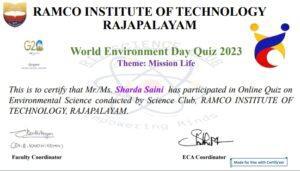
Organizer: Ramco Institute of Technology, Rajapalayam 626117
About the Quiz 2023
▶️Attempt the Quiz only once
▶️Score will be released only after
closing of the quiz.
▶️ If total marks scored is above 60% of the maximum marks , then E-
certificate will be emailed immediately.Or in 2minutes
▶️ Only 100 E – certificates will be
emailed per day.
- The last date for the quiz is 3rd June 2023
100% Correct Answers Here
Apply Link
1. The term ‘ecosystem’ was coined by
Sir Rutherford
Sir Arthur Tansley
Sir J. C. Bose
William Harvey
2. Plant is a/an
Abiotic component
Biotic component
Hydrosphere
Mineral resource
3. Windmills can be used to
Generate electricity
Generate paper
Generate gas
Gross modulation
4. Solar energy is a
Renewable resource
Non-renewable resource
Bio resource
Geosphere
5. The term ‘HOT SPOT’ in nature is associated with
Electricity
Biodiversity
Pollution
Industry
6. India is a _____ nation
Meso-diverse
Mega-diverse
Mono-diverse
Micro-diverse
7. Which of the following is a protected area?
National park
Eco-club
Sand dune
Nursery
8. Noise is measured in
dB
S/cm
Mg
TB
9. The principle of environmental education helps to make the sense of the topic from
Simple to Complex
Knowledge and Awareness
Skills and Awareness
All of the above
10. Silent Valley Project was initially sanctione in
Jharkhand
Kerala
Goa
Andaman & Nicobar Islands
11. The World Environment is observed on
May 5
June 15
July 15
June 5
12. Non-renewable resources are
Exhaustible
InExhaustible
Recylclable
None of the above
13. The term “Abiotic” means
Non-Living
Living
Both (a) and (b)
None of the above
14. Energy flow in an ecosystem is
Multidirectional
Bidirectional
Unidirectional
None of the above
15. Species that are confined only to a particular area, are
Endemic
Rare
Endangered
Threatened
16. The comparison of diversity between two ecosystem is called
Alpha diversity
Beta diversity
Gamma diversity
Ecosystem diversity
17. Ozone layer is destroyed by
Chlorofluorocarbon
Carbon dioxide
Sulphur dioxide
Ammonia
18. Eutrophication is related to
Air pollution
Water pollution
Soil pollution
Noise pollution
19. Sustainable development is introduced by
Norman Myer
Brundtland
UNCED
Amrita devi
20. The most well-known leader of Chipko movement is
Jashbai Patel
S. Bahuguna
Medha Patkar
B. D. Sharma
21. Fossil fuels are.
Renewable
Non-renewdble
Inexhaustible
None of the above
22. The term ‘ECOLOGY’ was first proposed and introduced in 1870 by German biologist
Ernst Haeckel
E. P. Odum
A. G. Tansley
Ramdeo Mishra
23.The anthropogenic sources of air pollution are
Pollen grains
Incinerations
Vegetative decaya
Forest fires
24. The Disaster Management Act was mandated at the state and District level in the year
2004
2005
2006
2007
25. The biogeographical region of India’ is divided into
5 Regions
7 Regions
10 Regions
15 Regions
26. Which one is the correct food chain?
Phytoplankton Zooplankton Fish
Zooplankton Phytoplankton Fish
Grass Fish Phytoplankton Zooplankton
Zooplankton Protozoans Fish
27. Reclaiming of land to its original state or to use it for productive purposes is known as
Watershed management
Resettlement
Wasteland reclamation
Sustainable development
28. Autotrophic organism is called
Producer
Consumer
Decomposer
Herbivore
29. Ecosystem involves interaction between
Plants and Animals
All Living and Non-Living organism
Plants and Non-Living organism
None of these
30. To qualify as Mega diversity, a region has lost of its original habitat at least
65%
70%
75%
80%
31. The coverage of fresh water on the earth is
97%
2.5%
1.5 %
4%
32. Meeting the needs of present, without compromising the ability of future generation to meet their own need is coined by
Amrita devi
Brundtland
Norman Myer
UNCED
33. Which of the following NGO’s is associated with “Chipko movement” ?
Dasholi Gram Swarajya Sangh
Narmadha Bachao Andolan
Kalpavriksh
Centre for Science and Environment
34. Tourist enjoy the aesthetic value of Biodiversity and this type of tourism is known as
Ecotourism
Medical tourism
Great time tourism
Wild life tourism
35. The major important indoor air pollutant is
Carbondioxide
Sulphurdioxide
Hydrogen sulfide
Radon gas
36. The flow of energy in an ecosystem is governed by
First law of Thermodynamics
Second law of Thermodynamics
Third law of Thermodynamics
Zeroeth law of Thermodynamics
37. Forests and Wildlife are
Renewable
Non-renewable
Inexhaustible
None of the above
38. Gas leaked in Bhopal Tragedy was
Potassium isothiocyanate
Sodium isothiocyanate
Methyl isocyanate
Ethyl isocyanate
39. Lichens are an indicator of
Air pollution
Water pollution
Noise pollution
Soil pollution
40. Which of the following is not a “Green house gas” ?
Oxygen
Chlorofluorocarbon
Methane
Carbondioxide
41. The zero population growth due to equal birth and death rates is called
Demographic transition
Fertility rate
Natural increase
Replacement level
42. Fossil fuels are mostly
Coal
Petroleum
Natural gas
All the above
43. Which is not an example of Renewable energy?
Wind energy
Solar energy
Nuclear energy
Biomass energy
44. The term “ Biodivesity” means
Variations of Plants
Variations of Animals
Varieties of Plants and Animals
Varieties of Plants, Animals and Microorganisms
45. The process of protecting of flora and fauna out of its natural habitat is called
Ex-situ Conservation
In-situ Conservation
Genetic conservation
None of these
46. Biotic and Abiotic components in the environment are
Independent of each other
Interrelated and Interdependent of each other
Interrelated but not Interdependent with each other
Neither Interrelated nor Interdependent with each other
47. The Populations of different species that live in the same area and interact with one another are called
Species
Biomass
Community
Population
48. Which of the following is not a fossil fuel?
Coal
Petroleum
Uranium
Natural gas
49. Which of the following is not a site for in-situ method for conservation?
Botanical garden
Biosphere reserve
Wild life Sanctuary
National park
50. The term “SUSTAINABLE DEVELOPMENT” was first used in
1985
1986
1987
1988
